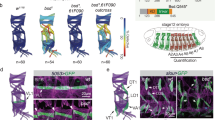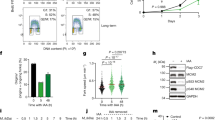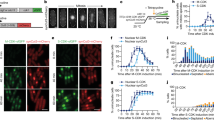Abstract
MUTATIONS in the Drosophila gene polo cause abnormal mitotic and meiotic divisions1,2. This gene encodes a 577-amino-acid protein that has an N-terminal putative kinase domain and a 300-residue C-terminal domain2. In budding yeast, a homolo-gous kinase is encoded by CDC5 (ref. 3), a gene required for nuclear division late in the mitotic cycle4 and during meiosis5. Murine homologues have also been described6,7. Here we show that the polo gene product immunoprecipitated from extracts of single Drosophila embryos can phosphorylate casein in vitro, and that the kinase activity peaks cyclically at late anaphase/telophase. This contrasts with the cyclical activity of cyclin B-associated p34cdc2 kinase, which is maximal upon entry into mitosis during the rapid cycles of mitosis in the syncytium.
This is a preview of subscription content, access via your institution
Access options
Subscribe to this journal
Receive 51 print issues and online access
$199.00 per year
only $3.90 per issue
Buy this article
- Purchase on Springer Link
- Instant access to full article PDF
Prices may be subject to local taxes which are calculated during checkout
Similar content being viewed by others
References
Sunkel, C. E. & Glover, D. M. J. Cell Sci. 89, 25–38 (1988).
Llamazares, S. et al. Genes Dev. 5, 2153–2165 (1991).
Kitada, K., Johnston, L. H. & Sugino, A. Molec. cell. Biol. (in the press).
Hartwell, L. H. J. Bact. 115, 966–974 (1973).
Schild, D. & Byers, B. Genetics 96, 859–876 (1980).
Clay, F. & Dunn, A. Proc. natn. Acad. Sci. U.S.A. (in the press).
Simmons, D. L., Neel, B. G., Stevens, R., Evett, G. & Erikson, R. Molec. cell. Biol. 12, 4164–4169 (1992).
Foe, V. & Alberts, B. J. Cell. Sci. 61, 31–70 (1983).
Yamashita, M., Yoshikini, M., Hirai, T., Fukada, S. & Nagahama, Y. Dev. Growth Differ. 33, 617–624 (1991).
Maldonado-Codina, G. & Glover, D. M. J. Cell Biol. 116, 967–976 (1992).
Byers, B. & Goetsch, L. Cold Spring Harbor Symp. quant. Biol. 38, 123–131 (1974).
Wood, J. S. & Hartwell, L. H. J. Cell Biol. 94, 718–726 (1982).
Gonzalez, C. & Glover, D. M. in The Cell Cycle: A Practical Approach (eds Brooks, R. & Fantes, P.,) (IRL, Oxford, 1993).
Whitfield, W., Millar, S. E., Saumweber, H., Frasch, M. & Glover, D. M. J. Cell Sci. 89, 467–480 (1988).
Frasch, M., Glover, D. M. & Saumweber, H. J. Cell Sci. 82, 155–172 (1985).
Whitfield, W., Gonzalez, C., Maldonado-Codina, G. & Glover, D. M. EMBO. J. 9, 2563–2572 (1990).
Marshak, D. R., Vandenberg, M. T., Seuk-Bae, Y. and Je Yu, I. J. Cell. Biochem. 45, 391–400 (1991).
Author information
Authors and Affiliations
Rights and permissions
About this article
Cite this article
Fenton, B., Glover, D. A conserved mitotic kinase active at late anaphase—telophase in syncytial Drosophila embryos. Nature 363, 637–640 (1993). https://doi.org/10.1038/363637a0
Received:
Accepted:
Issue Date:
DOI: https://doi.org/10.1038/363637a0
This article is cited by
-
Plk1 inhibition leads to a failure of mitotic division during the first mitotic division in pig embryos
Journal of Assisted Reproduction and Genetics (2017)
-
Roles of Polo-like kinase 3 in suppressing tumor angiogenesis
Experimental Hematology & Oncology (2012)
-
The mammalian centrosome and its functional significance
Histochemistry and Cell Biology (2008)
-
Targeting polo-like kinase 1 for cancer therapy
Nature Reviews Cancer (2006)
Comments
By submitting a comment you agree to abide by our Terms and Community Guidelines. If you find something abusive or that does not comply with our terms or guidelines please flag it as inappropriate.



